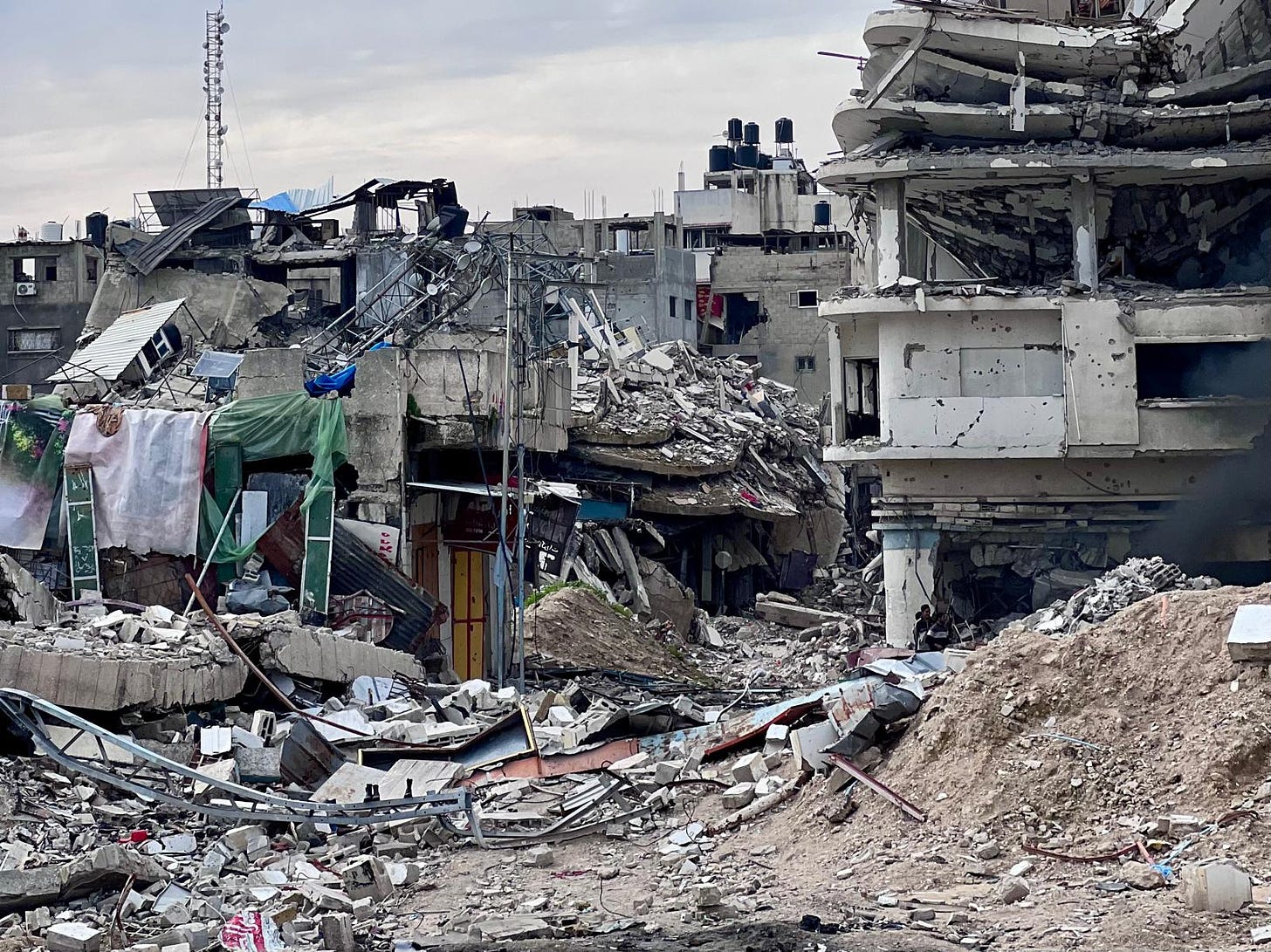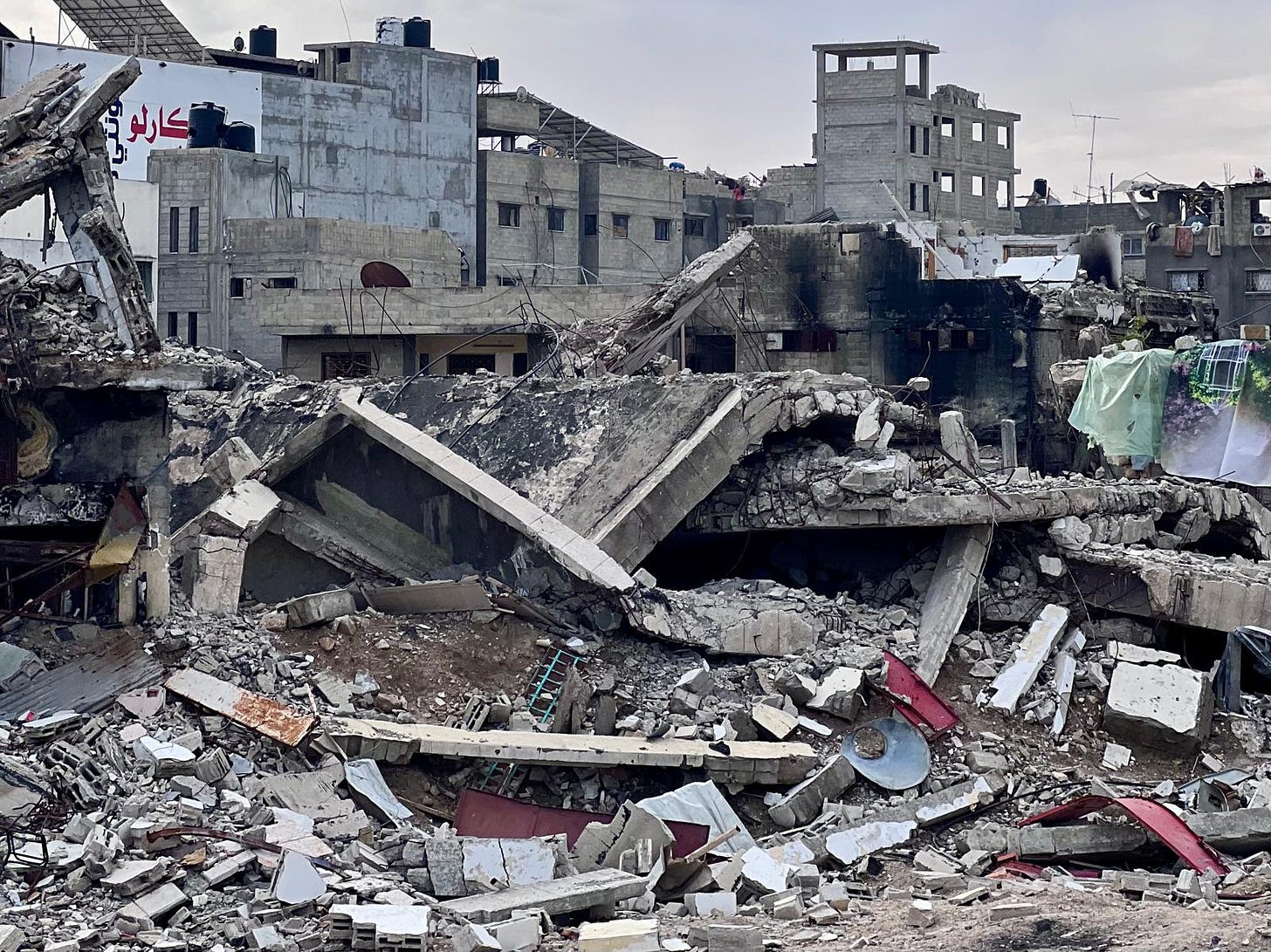There Is Nothing "Limited" About Israel's Invasion of Lebanon
There is a sense of permanence to ground invasions, a feeling that this isn’t a passing storm. It’s a storm that stays, settles, and refuses to leave.

We don’t know exactly what’s about to happen now after Israel has launched a ground invasion in Lebanon. But a familiar tightness grips my chest as I watch the news: a recollection of the same nightmare I’ve lived before.
I remember standing on a rooftop in northern Gaza nearly a year ago, filming live the black smoke rising as the horizon burned. A cloud of dust kept approaching, with a sense of fear settling over the streets. And the headline—“Israel’s ground offensive had just begun.”
The horror of those attacks still reverberates daily across Gaza. The devastation has reached every corner, and death has become a tragic constant. The people now know better. What was initially called a “limited ground operation to target Hamas” has effectively leveled Gaza, destroying every aspect of life for two million people.
The first sign that something worse than airstrikes was coming was the constant, ominous hum of drones. Then came the distant rumble of tanks. The ground offensives brought a new kind of terror to an already terrorized population.
There’s a stark difference between airstrikes and ground invasions. Airstrikes are sudden and brutal, and they come with an odd, imminent finality—a bomb falls, and the destruction is instant and cataclysmic. Ground invasions, though, are different. They creep in slowly, block by block, with no clear end in sight to the scale or aftermath of each stray shelling. More than just a means to control land, they destroy everything that stands in their way—time, life, space, spirit. There is a sense of permanence to ground invasions, a feeling that this isn’t a passing storm. It’s a storm that stays, settles, and refuses to leave.
When the tanks invaded Gaza, streets that were once familiar became alien landscapes. Rubble replaced homes. The landmarks of daily life—the mosque at the corner, the school at the end of the road—were erased in a matter of hours. It wasn’t just the destruction of buildings; it was the destruction of place, the erasure of identity, community, and history. When you can’t even recognize your own neighborhood, when the streets you grew up on become piles of debris, there comes a feeling of a deep, unspeakable loss.
In anticipation of the Israeli strikes, homes in southern Lebanon have been emptied, neighborhoods abandoned, families torn by displacement. These offensives don’t just displace people—they destroy any sense of safety they once had. Lebanon’s people, like Gaza’s, find themselves trapped between fleeing to nowhere and staying in a place where survival is uncertain.
Similarly in Gaza, the people have grown accustomed to living in a state of perpetual aftermath, always waiting for the next shelling, the next moment when our lives will be torn apart again. It’s a psychological toll that the concept of a “limited” invasion never accounts for.
I’ve seen the faces of families forced from their homes. In the north of Gaza, where I spent months both reporting and surviving, displacement shelters were all that one could see. People carried nothing with them but memories and a few bags of belongings—whatever they could salvage. I remember interviewing a father whose home was destroyed. He’d lived through this before. He knew the destruction was inevitable, so he and his family packed everything they could into bags in the days before the offensive. Still, when they finally had to flee, there was no time to take it all. He was left with a handful of possessions, his children, and the heavy silence of what had been his home.
I remember walking through the Al Shujaiyya neighborhood in eastern Gaza last February. The silence was eerie, broken only by the occasional crackle of distant gunfire. The houses were rubble, their former inhabitants now huddling in makeshift shelters. I could feel the absence of life, the way war drains a place of its spirit. Even the air felt different—heavier, as if weighed down by loss.

And, trust me, that loss doesn’t go away. In Gaza, the aftermath of a ground invasion lingers long after the soldiers retreat. The physical damage may heal, but the psychological scars remain. Every time a child hears the rumble of a distant explosion or the whirr of a drone overhead, the fear returns.
I fear Israel is following the same playbook in southern Lebanon. Despite claims of a brief offensive, the impact will be lasting. Homes can be rebuilt, but the sense of security can’t. The people will remember, as we in Gaza do, that these offensives are never truly “limited.” They mark the beginning of something much longer and more insidious—a slow, suffocating siege.
In Gaza, when the tanks withdrew from some areas, the war entered a different phase. It didn’t make headlines as shocking as before, but it wore us down, day by day, and it continues to do so. The blockade itself is an act of war—one fought not with bullets, but with the slow suffocation of life. It’s the steady erasure of hope, the incremental destruction of a future. I’ve seen it. I’ve lived it. And I worry Lebanon is now facing the same fate.
In my reporting, I’ve spoken with children who grew up knowing nothing but war and siege. I’ve seen the way their eyes are dimmed, how they no longer dream of anything beyond survival. In Gaza, a 10-year-old boy has lived through four wars. He doesn’t talk about what he wants to be when he grows up; he talks about how he plans to stay alive. This is what war does to a generation. This is what a “limited” invasion leads to.
But even as the Israeli troops stretch across Lebanon’s southern borders, there is something else that I know Lebanon’s people have in common with Palestinians in Gaza: resilience. The Lebanese have fought before, and they will fight again, not just with weapons, but with their courage, and their unwavering defiance in the face of an enemy that seeks to erase their homes, their history, their very lives. Just as we have resisted in Gaza, refusing to disappear despite every effort to crush us, Lebanon’s people will resist.
The Lebanese, like the Palestinians, are bound by a shared history of resistance. It’s in the way they rebuild, brick by brick, even when the dust has barely settled, the way they mourn their dead but refuse to surrender to despair. They understand, just like Gazans, that their fight isn’t just for territory. It is a fight for identity, for the right to exist, to live freely on their own land.
Despite the falling bombs and advancing tanks, the people of Lebanon will not be erased. They will stand with courage, with defiance, with an unshakable belief that this land, these homes, this life is worth fighting for. They will resist, not just for survival, but for a future that refuses to be stolen. And in that resistance, they will find their strength, their dignity, and, ultimately, their freedom.





Thank you for this, Mohammed
I am crying reading this gorgeous, moving, eloquent expression of truth. Mohammed, your capacity for facing the horrific realities head-on and at the same time preserving hope - for Palestine, Lebanon, maybe even humanity - reflects the best of what Palestinians are and why Israel is so afraid of them.